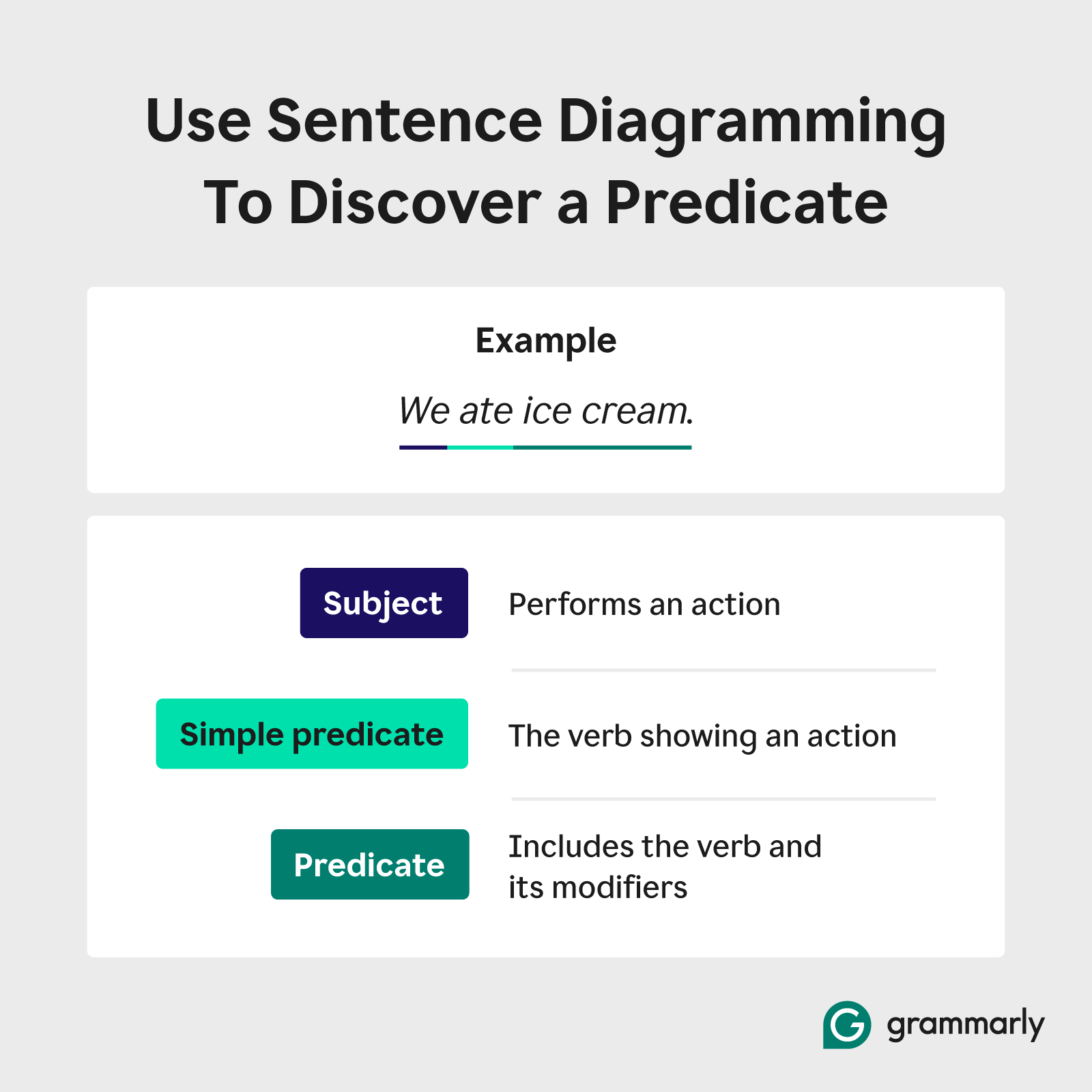
Key takeaways:
- A predicate is a grammatical term for the words that describe the action in a sentence or clause.
- A predicate explains what a subject does.
- There are five different types of predicates, each containing unique qualities.
A predicate is the grammatical term for the action taken in a sentence, which generally includes the verb and all the words that add detail to the action or subject. Sentences are made up of a subject and a predicate.
As an example, take the simple sentence “I ate.” In this case, I is the subject and ate is the predicate.
Predicates must always include at least one verb to represent the action, but can also include other words and phrases, such as prepositional phrases, adverbs, direct objects, or indirect objects.
Predicates are a core component of English grammar and sentence structure. Understanding how they work helps writers:
- Construct clear and effective sentences
- Avoid ambiguity
- Build a strong grammatical foundation
In addition, knowing the different types of predicates helps you create complete and grammatically correct sentences.
Table of contents
Common predicate mistakes and how to fix them
Identifying predicates
There is more than one type of predicate, which we discuss below. The most basic type is called a simple predicate. They are the easiest to identify since they are simply a sentence’s main verb or verb phrase, without modifiers. To identify a predicate in a sentence, regardless of which type of predicate you use, you should:
- Identify the subject of the sentence. The subject is a noun, pronoun, or noun phrase that the sentence is about.
- Identify the simple predicate. The simple predicate is a verb—the action taken in the sentence.
- Identify the rest of the predicate. The entire predicate is the verb and all the words that modify or complete its meaning.
When sentences become longer and more intricate, sentence diagramming is a helpful tool for identifying the different components of a sentence. By finding the subject and examining the verb and its related words, you can effectively identify and categorize the different types of predicates.
Types of predicates
There are five different types of predicates, each with unique qualities. Explore each type, its definition, and an example below:
| Type of predicate | Definition | Example with explanation |
| Simple predicate | A simple predicate is the main verb or verb phrase (the main verb plus any words that assist it) in a sentence explaining what the subject does, is, or feels. It is a core action or state of being. |
The dog barked loudly. The dog is the subject. The simple predicate is barked, because it’s the main verb showing the action the dog performed. The adverb loudly modifies the verb but is not part of the simple predicate. |
| Complete predicate | A complete predicate includes the simple predicate along with all the other words, like adverbs and prepositional phrases, that describe the action or state of the subject fully. |
The dog barked loudly at the mail carrier. The complete predicate includes the simple predicate (barked) as well as the adverb (loudly) and the prepositional phrase (at the mail carrier) that modify the verb and provide more information about the action. |
| Compound predicate | A compound predicate occurs when a single subject performs two or more actions, or is in two or more states of being. The actions or states are joined by a coordinating conjunction such as and, or, or but. |
The dog barked loudly and wagged its tail excitedly. This sentence combines the original simple predicate expanded with an adverb (barked loudly) with another verb phrase (wagged its tail excitedly), joined by a conjunction (and). Both actions are attributed to the same subject (the dog). |
| Predicate adjective | A predicate adjective is an adjective that follows a linking verb (i.e., is, are, was, were, seems) and describes a quality or characteristic of the subject. |
The dog seemed agitated after barking loudly. In this sentence, the dog is the subject, seemed is the linking verb, and agitated is the predicate adjective because it follows the linking verb and describes the state of the subject. |
| Predicate nominative | A predicate nominative (also called a predicate noun) is a noun or pronoun that follows a linking verb and renames or identifies the subject. |
After his heroic rescue, the stray dog became a local hero. The predicate nominative (a local hero) describes what the subject (the dog) is or becomes through the use of a linking verb (became). |
How to use predicates
Choose your predicate based on what readers want to know or understand about your subject. Think of a predicate as the driving force behind the action or state of your subject.
When deciding the exact predicate and type you’ll use, take the following into account:
- Your subject’s personality: The predicate is where action happens and reveals a subject’s characteristics. Choices with the predicate contribute to how the reader perceives your subject.
- Your audience: The predicate you choose should speak to your audience’s level of understanding and any shared knowledge. It should capture their interest and engage them.
- The purpose of your writing: As a writer, your purpose acts like a compass, directly shaping the actions your sentences convey. The predicate, in particular, is essential for realizing a sentence’s intended purpose.
- Your tone: A predicate plays a significant role in establishing and maintaining your tone.
In a technical report for subject matter experts, choose precise language with simple predicates to ensure clarity and avoid unnecessary embellishment. For more creative writing intended to evoke emotion through vivid imagery, include more elaborate and descriptive predicates with linking verbs.
Your choice of predicate will ultimately shape how readers receive the sentence’s message. Simple predicates allow for clarity and precision. Using strong action verbs in simple predicates creates a sense of power and directness, making them a great option for business writing.
Complex predicates, like compound predicates and predicate adjectives, give you more room for detail and description. Including linking verbs and predicate adjectives creates a descriptive and reflective tone useful in reports and analysis.
Other examples of predicate adjective and predicate nominative
Explore the following predicate examples of predicate adjective and predicate nominative. In each example, the predicate is bolded to help you better understand its importance and how it’s used in a sentence:
| Example | Type of predicate | Why this is a predicate |
| My neighbor is very kind. | Predicate adjective | Is very kind is the predicate in this example. The linking verb (is) connects the subject (my neighbor) to the adjective (kind). The adjective (kind) modifies the subject (the neighbor), describing a quality. An adverb (very) modifies the predicate adjective. |
| The music sounded peaceful. | Predicate adjective | Sounded peaceful is the predicate in this example. The linking verb (sounded) connects the subject (the music) to the adjective (peaceful). The adjective (peaceful) describes a quality of the subject (the music). |
| The winner of the race became a national hero. | Predicate nominative | Became a national hero is the predicate in this example. The linking verb (became) connects the subject (the winner of the race) to the noun phrase (a national hero). The noun phrase (a national hero) renames or identifies the subject (the winner of the race). |
| They will become doctors after graduation. | Predicate nominative | Will become doctors after graduation is the predicate in this example. The linking verb (will become) connects the subject (they) to the adverbial phrase (after graduation). The predicate nominative (doctors) renames the subject (they). |
Common predicate mistakes and how to fix them
While predicates may seem straightforward, making mistakes when using them as you craft sentences is possible. Some common mistakes to be aware of and fix include:
Omitting a main verb and creating sentence fragments
A verb is required for complete sentences to express action or a state of being; its omission results in an incomplete thought, which is known as a sentence fragment.
| Mistake | Correction |
| The heavy rain and strong winds, making it difficult to see or hear anything outside. | The heavy rain and strong winds made it difficult to see or hear anything outside. |
Subject-verb agreement issues
Subject-verb agreement means the verb in a predicate must agree in number (singular or plural) with its subject. Singular subjects require singular verbs, and plural subjects require plural verbs.
| Mistake | Correction |
| The group of students are planning a field trip. | The group of students is planning a field trip. |
Confusing objects or complements with the same verb
Sometimes, writers confuse direct objects, indirect objects, and subject complements (predicate nominatives and predicate adjectives) with each other because they all follow the verb. Consider whether the word receives the action (object) or renames or describes the subject (complement).
| Mistake | Correction |
| She felt sadly. | She felt sad. |
Knowing these common mistakes will help you identify them when you make them, allowing you to apply quick fixes to adjust your sentences properly.
Use predicates for proper sentence structure
Including a predicate as you write ensures you have the right sentence structure to describe the action in a sentence. Predicates help you define your subject and introduce your tone to readers. Predicates can be challenging because there are different types, but a predicate is necessary in every sentence to form complete thoughts and ideas.
Grammarly aligns your sentence structure
Understanding how predicates function is essential to writing clear, complete sentences—but even seasoned writers can overlook key elements like subject-verb agreement or sentence fragments. Grammarly helps catch those issues in real time, flagging incomplete predicates, awkward phrasing, and unclear structure before they affect your writing. Whether you’re composing an email, report, or creative piece, Grammarly’s AI sentence rewriter makes it easy to rewrite sentences in just a few clicks.
Predicate FAQs
Continue reading for answers to more in-depth questions about using a predicate as a grammatical function.
What’s the best way to explain predicates to kids?
When explaining predicates to kids, it’s best to keep the lesson engaging with analogies they can understand. For example, compare the subject of a sentence to a main character in a movie or TV show, then explain that the predicate is everything they do, what they say, and what happens to them.
Then, focus on the action part of predicates using clear and relatable examples. Providing advanced examples to younger kids will make it more difficult for them to grasp the concept.
Are predicates the same thing as a verb?
No, a predicate is not the same thing as a verb. However, verbs are a critical and required part of predicates since they describe the main action a subject takes. Also, a predicate, especially a compound predicate, can contain multiple verbs.
Does a sentence always contain predicates?
Yes, every complete sentence must contain a predicate. A predicate is essential because it serves as the part of the sentence that tells the reader about the subject. Without predicates, you’ll have a sentence fragment, which is an incomplete thought.
Even in imperative sentences, where the subject is implied, a predicate is present and essential to forming a complete sentence and thought. The predicate in an imperative sentence is usually the imperative sentence itself as the action, command, or request.



